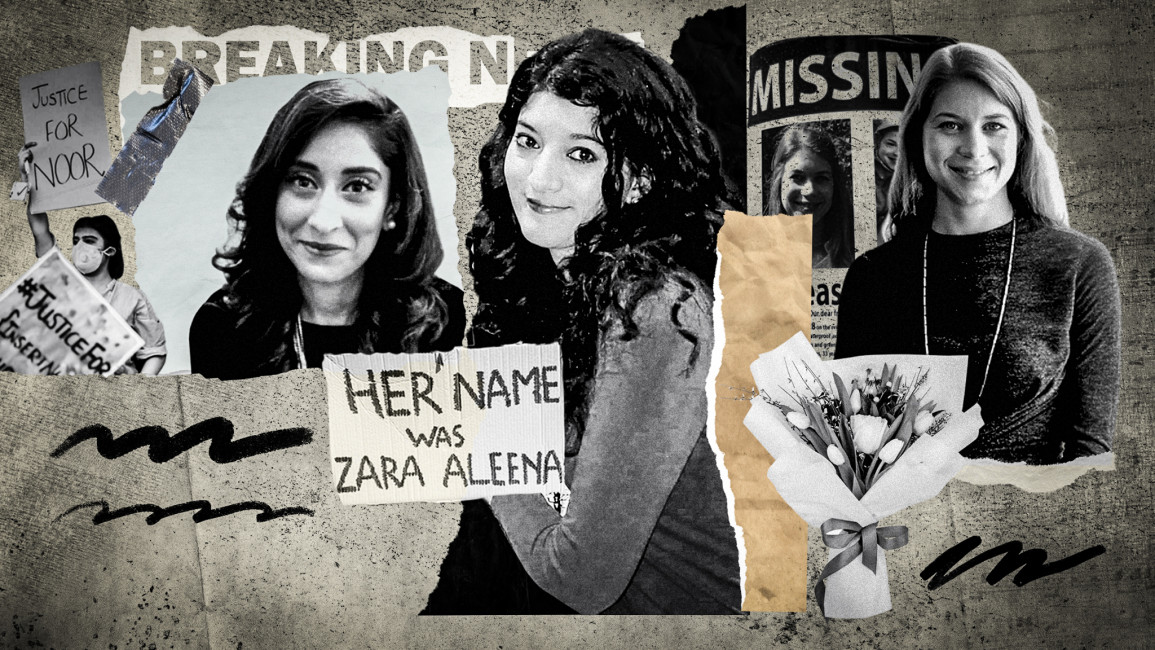
The epidemic of femicide knows no borders
The process is identical every time. A name keeps popping up on our various social media feeds – the details of her brutal murder scarce but clear enough to conclude that she is yet another victim of domestic violence. Over the days that follow, we learn more about her. A hashtag appears. Links are made to the murders of countless other brilliant, vivacious women – erased from the planet in seconds for refusing a marriage proposal, wanting a divorce, walking down the street.
As friends and family of the deceased come forward to share their grief, women congregate – online and in person – to share their shock. “It could have been you,” we say to each other. “It could have been me.” In the safety of collective, grieving sisterhood, we share stories of violence against women – in board rooms, bedrooms, and the street – and discuss how better we can protect each other given the endless failings of our nation states.
We know, inherently, that geography does not matter - be it an apartment in Islamabad’s affluent neighbourhood, or a busy residential road in East London, the inherent violence of the patriarchy is coming for us all.
And so, the process has begun once again. This time, the latest victim killed by the poison of patriarchal gender norms is 29-year-old Pakistani American photographer, Sania Khan. Sania’s ex-husband flew from Georgia to Chicago, where he shot her dead in her apartment earlier this week, before committing suicide. Sania had been vocal about the stigma of divorce within South Asian culture on her TikTok, writing: "Going through a divorce as a South Asian woman feels like you failed at life sometimes. The way the community labels you, the lack of emotional support you receive, and the pressure to stay with someone because 'what will people say' is isolating.”
''The reality is, there is no respite – from government to the golf course, boardroom to the living room – the tentacles of the patriarchy octopus has us firmly in its grip. Every time another woman is murdered, the same questions are regurgitated as if the entire world is suffering from collective amnesia: what was she wearing? Why was she out so late? Why was she walking alone?''
In 2021, 48% of South Asians in the US reported experiencing domestic violence.
Khan was killed two days before the year anniversary of Noor Mukadam’s murder. 27-year-old Mukadam was tortured, shot and beheaded in Islamabad, Pakistan in July 2021 after refusing a marriage proposal. The daughter of a former ambassador, her case quickly became high-profile. Countless women came forward, identifying Mukadam’s killer and his vast affluent network as known misogynists - frequently harassing and abusing women in the country’s capital.
While her case made headlines, countless more went unreported. Pakistan’s Ministry of Human Rights reports 28% of women between the ages of 15 and 49 have experienced physical violence since the age of 15.
Soon after Mukadam’s murder, hundreds gathered to protest violence against women in Islamabad. ‘Women shouldn’t leave home unsupervised’ read one placard. ‘This country is safer for rapists than for women’ read another.
Pakistan’s then prime minister, Imran Khan, was asked in an interview about the epidemic of sexual violence and rape in the country. The interviewer referenced some of the politician’s earlier, problematic remarks, to which he responded: “We don’t have discos here. We don’t have nightclubs. It is a completely different society [and] way of life here…If a woman is wearing very few clothes, it will have an impact on the men, unless they’re robots. I mean, it is common sense”. Later, when pressed, Khan ‘clarified’ his comments: “Anyone who commits rape - solely and solely, that person is responsible. So, let’s be clear about that: no matter how provocative a woman is or whatever she wears, the person who commits rape is responsible. Never is the victim responsible.”
Remarkably, the caveat of how “provocative” a woman is or what “she wears” remained a necessity, despite the politician identifying the sheer scale of children sexually abused in the country. A month later, in August 2021, 300-400 men sexually assaulted a TikTok star in a park in Lahore. Many were quick to point out that the TikTok star was responsible for her fate. She had posted a TikTok inviting her fans to a meet and greet in the park. That, apparently, is grounds for sexual assault because “doesn’t she know any better”?
Four-thousand miles away from Pakistan, the crime of walking was committed by Sabina Nessa and Sarah Everard — and most recently — by 35-year-old Zara Aleena, who was murdered as she walked home last month. Aleena was walking on Cranbrook Road – one of the busiest main roads in this area. It is the route we take to our local tube station — heading to work, to meet friends for dinner, to live our lives. I walk it when I go to the post office just off Beehive Lane. Sometimes I walk that route to Valentine’s Park. “It could have been you,” we say to each other. “It could have been me.”
Overseas, the impression remains that we – as brown women – are safer here. “This wouldn’t happen to you here,” my Pakistani aunt says. What she doesn’t realise is that here, in the UK, where we do indeed have discos and nightclubs, 41,332 women were victims of rape in the year ending September 2021. 32% of women are likely to be killed by a partner or ex-partner.
According to the Office for National Statistics, police recorded “259,324 offences flagged as domestic abuse-related in the period March to June 2020” – a 7% increase because of lockdowns imposed due to Covid-19. It is impossible to say how many more offences went unreported. Safe to add global pandemic to the list of crimes we commit as women, I think.
We, too, have a former PM just brimming with support for women. Like in 2005, when Boris Johnson told voters that “voting Tory will cause your wife to have bigger breasts”. Or in his book Life in the Fast Lane, where he wrote the following about his experience of driving a Ferrari: “It was as though the whole county of Hampshire was lying back and opening her well-bred legs to be ravished by the Italian stallion”. When hosting the World Islamic Forum in London, he said women in Malaysia only went to university “to find men to marry”. His policies, of course, are more catastrophic for women than the vitriol that escapes his privileged mouth. Cuts to essential social and community services for women suffering domestic violence have left thousands without support.
The reality is, there is no respite – from government to the golf course, boardroom to the living room – the tentacles of the patriarchy octopus has us firmly in its grip. Every time another woman is murdered, the same questions are regurgitated as if the entire world is suffering from collective amnesia: what was she wearing? Why was she out so late? Why was she walking alone?
This from the same wretched ilk that would brand the victim a “liar” for having reported rape. How have we not figured this out yet? Guess what: it doesn’t matter what she’s wearing or where she’s walking or where she lives or whether she says something. The silence, clothes, location is not killing us. Men are killing us. Routinely. And in horrifically violent ways. The men we know and the men we don’t know; those around the family dinner table and those on the supreme court. If they aren’t killing our bodies, they’re killing our spirits — suffocating what it means to be alive with the consistent vigilance we’re required to practice while working, sitting, standing, walking, sleeping, Breathing.
As long as the system of patriarchy reigns supreme – where our bodies are of value, but our beings are not, where we are not respected as half of this planet’s cogent, functional, valuable population, your name or mine will be next.
Ayman Khwaja has more than a decade of experience across print, digital and broadcast platforms. She currently works as a Communications Director for a media group.
Follow her on Twitter: @aymankhwaja
Have questions or comments? Email us at: editorial-english@alaraby.co.uk
Opinions expressed here are the author's own, and do not necessarily reflect those of their employer, or of The New Arab and its editorial board or staff.



